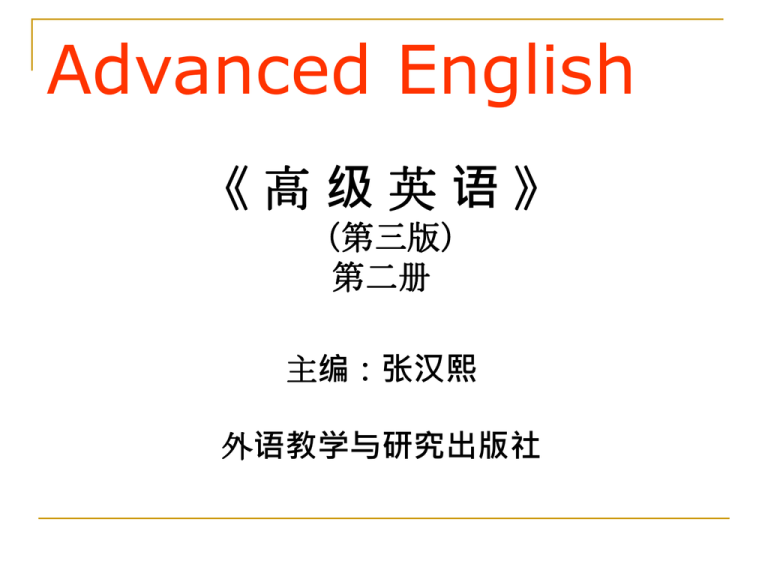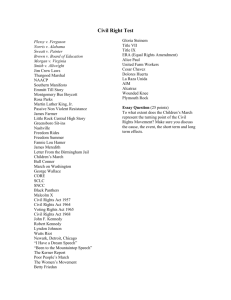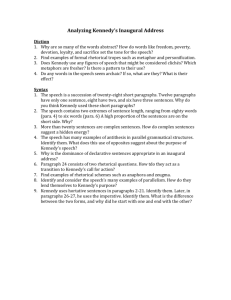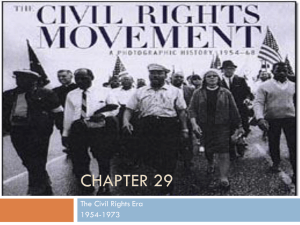by John F. Kennedy
advertisement

Advanced English 《高级英语》 (第三版) 第二册 主编:张汉熙 外语教学与研究出版社 Lesson 3 Inaugural Address (January 20, 1961) by John F. Kennedy Teaching Points I. Warming up II. Background knowledge III. Language points IV. Text Analysis V. Rhetorical devices VI. Writing Inaugural Address J. F. Kennedy John Fitzgerald Kennedy Birth: May 29, 1917 Death: November 22, 1963 Term of Office: January 20, 1961 November 22, 1963 Number of Terms Elected: 1 term; Was assassinated while in office First Lady: Jacqueline L. Bouvier John Fitzgerald Kennedy Kennedy, 35th president, Democrat, was born on May 29, 1917 in Brookline, Mass, the son of Joseph P. Kennedy, financier, who later became ambassador to Great Britain. He entered Harvard, received a BS from Harvard 1940. He served in the Navy and won the Navy and Marine Corps Medal. John Fitzgerald Kennedy He wrote "Profiles in Courage", (《勇 敢者传略》)which won a Pulitzer prize. 1947-1952 served as representative in the congress 1952 elected to the senate 1960 He won the Democratic nomination for president and defeated Richard M. Nixon, Republican John Fitzgerald Kennedy Kennedy family --- fully engaged in politics Joseph Patrick Kennedy -- father (18881969) US ambassador to Britain born in Boston graduated from Harvard Joseph Patrick Kennedy He engaged in banking shipbuilding investment banking motion-picture distribution a millionaire at 30 years old John Fitzgerald Kennedy A summary: 1. 35th President of the U.S.(1961-1963) 2. a democrat, an eloquent speaker 3. the youngest man ever elected to the presidency 4. born in Massachusetts, inherited a background of politics wealth and determination 5. a Catholic John Fitzgerald Kennedy 6. As president, he faced the Civil Rights problem at home and Cuba crisis of 1962. 7. His assassination at Dallas in November 1963 was a shock from which the U.S. has found it hard to recover and the murder is still a riddle. Quotes from John F. Kennedy "Our task now is not to fix the blame for the past, but to fix the course for the future." "If a free society cannot help the many who are poor, it cannot save the few who are rich." "Those who make peaceful revolution impossible make violent revolution inevitable." Quotes from John F. Kennedy "Those who make peaceful revolution impossible make violent revolution inevitable." "Domestic policy can only defeat us; foreign policy can kill us." "I want every American to stand up for his rights, even if he has to sit down for them." Quotes from John F. Kennedy "I believe that this nation should commit itself to achieving a goal, before this decade is out, of landing a man on the moon and returning him safely to earth." "We stand today on the edge of a new frontier - the frontier of the 1960s - a frontier of unknown opportunities and perils - a frontier of unfulfilled hopes and threats." "And so, my fellow Americans: Ask not what your country can do for you - ask what you can do for your country." Strange coincidences between President Lincoln and President Kennedy Abraham Lincoln was elected to Congress in 1846. John F. Kennedy was elected to Congress in 1946. Abraham Lincoln was elected President in 1860. John F. Kennedy was elected President in 1960. John Fitzgerald Kennedy Contributions: 1. His most important act was his successful demand on Oct.22. 1962 that the Soviet Union dismantle its missile bases in Cuba. 2. He established a quarantine of arms shipments to Cuba and continued surveillance by air. 3. He defied Soviet attempts to force the Allies out of Berlin. 4. He made the steel industry rescind a price rise. Contributions: 5. He backed A. civil rights B. a mental health program C. arbitration of railroad disputes D. expanded medical care for the aged E. astronaut flights and satellite orbiting Inauguration Day On January 20 since 1937 On April 30,1789, George Washington stepped onto a balcony of Federal Hall in New York City, placed his hand on a Bible and swore to "preserve, protest and defend the constitution of the United States". Inauguration Day He then read an earnest speech, calling for "united and effective government". Thus began a unique American institution --Inauguration Day --- those dramatic hours when a new president faces the people for the first time. He must tell the people what he's going to do as president. Inaugural Address Memorable words have been uttered in inaugural address. It is a speech, lecture officially made by a person on taking office. The social background In what period in history did Kennedy become president? in 1960's Cold war is sth. which marks the situation in 1960's. The world is mainly divided into two hostile camps. 1) socialist camp -- headed by the Soviet Union 2) capitalist camp -- headed by the US The camps opposed each other politically. Detailed study of the text: Para1 opening paragraph importance / significance of his election as president of the US 1. observe 2. celebrate antithesis: end -- the end of Eisenhower's presidential term beginning -- the beginning of Kennedy’s presidential term renewal ---- the continuation of presidency and office of president change -- the change from Eisenhower to Kennedy solemn -- refer almost exclusive to an extremely formal and inspiring religious ritual. ( grave ) very serious. a ~ oath 庄严的誓言 a ~ dedication to the cause of freedom 为自由事 业而始终不渝的献身 prescribe --- set down / impose What punishment does the law prescribe for this crime? Government schools must work for a prescribed number of days each year. Good citizens do what the laws prescribe. Someone who behaves as foolishly as you have no right to prescribe how others should behave. Para.2 the general situation of this world topic sentence --- The world is very different. In what way is the world different? The world is different in the way of science and technology. People have modern and advanced science and technology. revolutionary belief -- human rights All men were created equal and God had given them certain unalienable rights which no state or ruler could take away from them. 比较 benevolence -- an unacted-upon feeling generosity -- actual behavior e.g.. He was a plantation owner who looked on his slaves with benevolence but could hardly be accused of treating them with generosity. 他是一个以仁慈之心看待他的奴隶而谈不上 慷慨厚待他们的庄园主。 at issue -- undecided , in dispute The point at issue is whether you are willing to go abroad or not . That is not the point at issue. without issue – to die without children He died without issue. torch This refers to the privilege and burden of leading the nation being passed to a new generation. The original reference is to the Olympic games before which a torch is carried from runner to runner. *The flame of the torch eventually lights a fire that signals the opening of Olympics. a metaphor ——duty ——revolution ——responsibility --- of keeping human rights heritage --- all the qualities, traditions or features of life that have been continued over many years and passed on from one generation to another, used especially to refer to things that are of historical importance or that have had a strong influence on society. inheritance -- 1. money or property which you receive from someone who is dead 2. a situation or state of affairs which has been influenced by a particular event, person, book etc.(heritage) general policy of the US People in the US must keep and defend human rights not only in the US but also in the world as well. Para.4 strong determination Kennedy puts the US to the leader, so he says in order to keep human rights, we shall.... Para 5. transition A one sentence paragraph that functions as a transition from the general to the specific. In the following paragraphs he will be addressing different specific groups of nations. This much we promise to do and we promise to do more. allies -- ally. Britain, Canada, New Zealand, Australia,/ West European countries a country that has a treaty or an agreement to help and support another country, esp. during a war. allied --- adj. the Allied and Associated Powers 协约国 WWI the Allied Military Government 联合国民政府 WWII antithesis - United we can do everything. Divided we can do nothing. --- the importance of unity Para. 7 Whom did he address? --- some newly independent countries He promises to aid (support) the newly independent countries so that they can remain free and independent. ranks of the free - the community of free and independent nations a far more iron tyranny --- a communist dictatorship "riding the back of a tiger" -Compare "seeking the aid of socialist countries" to "riding he back of a tiger" Para. 7 2) Those countries which foolishly seek the aid of socialist countries will end up by losing their independence as many other countries did in the past. It is dangerous to ride the back of the tiger. If you do, you will be swallowed up by the tiger. You will lose your power and independence . Para 8 Whom did he address? the developing countries half the globe - the continents of Africa and Asia constitute almost one half of the land surface of the globe. Para. 9 He is speaking to Latin American countries. Usually the US regards the Latin American countries as the backyard of the US, for it has special interest in these countries. 1. He offered special pledge that all Latin American countries to work together to make progress. 2. He warned the enemies not to interfere in the internal affairs of these countries, because we are master of this hemisphere. prey -- metaphor comparing "peaceful revolution" to an animal which might fall victim to enemy nations. We will not allow any enemy country to subvert this peaceful revolution which brings hope of progress to all our countries. Para.10 He is addressing the United Nations. The UN is our last and best hope of survival in a world where the instruments of war have far surpassed and exceeded the instruments of peace. Para.10 1) to prevent the UN from becoming an assembly where people just criticize, insult and abuse each other 2) to strengthen the power of UN to protect the newly independent and weak nations 3) to enlarge the area in which its authority and mandate would continue to be in effect or in force make themselves our adversary - clever choice of words This phrase throws the blame for confrontation and world tension on the other party. The US has done nothing to create enemies. It's the other side that is challenging the US. not pledge -- not promise but a request -- but asking the other side to consider his proposal 1) point out danger danger-- self destruction ( the Third World War) Advanced weapons will destroy the whole mankind whether intentionally or accidentally sincerity is always subject to proof - One's sincerity must be proved by facts. People may say or promise all kinds of things but they must be proved by deeds. subject to – depending on 取决于,尚待,在……的条件 下 They have authority to decide, subject to the minister's approval. The treaty is subject to ratification. 认可,批准 The plan is subject to confirmation. tap the ocean depths --- draw upon or make use of the wealth that lies deep in the oceans mine the ocean beds for valuable metals etc. "undo the heavy burdens..." A Biblical quotation is used in keeping with his biblical style; in keeping his Catholic upbringing. What are the specific proposals? 1. control arms 2. use /develop science for peace purpose instead of the war purpose. explore the stars conquer the desert eradicate disease tap the ocean depths encourage the art and commerce 3. enjoy human rights Para.19 point out purpose, object We must work together to make a new world order. strong are just -- The strong nations do not bully the weak. weak secure -- The weak nations feel safe. Para.20 conclusion one hundred days -- historical allusion, famous period in American history, in President F.D. Roosevelt's presidential term one hundred days During the famous “hundred days” ( Mar-Jun. 1933), Roosevelt‘s administration rushed through congress a flood of anti-depression measures (more than 70 bills for approval), which were generally known as Roosevelt’s “New Deal”. “新政” New Deal A series of economic policies introduced by President Franklin D. Roosevelt after the Great Depression left the U.S. economy in a dismal state. The programs were implemented to provide relief to millions of Americans that were stuck in a state of poverty as a result of the Great Depression. The various programs were rolled out over five years (1933-1938) and covered a range of items including labor, bank, and relief reforms. New Deal The New Deal had many opponents who felt the programs implemented built up the power held by the government and promoted capitalism. With the start of World War II, the programs created by the New Deal became practically unnecessary as GNP and unemployment rates improved drastically as men became soldiers and women took over jobs previously held by the men. one hundred days Bills: “Banking Act”《银行法》 '' National Industrial Recovery Act" 《国家工业复兴法》 "Agricultural Adjustment Act" 《农业调整法》 The proposals can not be completed in a short time, but let's try and begin. Para.21-27 He appeals to his fellow Americans to support him and to do everything they can, even to sacrifice their lives for their country. past --- Many Americans died for their country. They showed their loyalty to their country. present --- Now our generation is called upon to face the challenge of the Cold War, to struggle against poverty and disease. twilight struggle --- not clear, abstract, tyranny, poverty, disease and cold wars are not bloody wars. “rejoicing in hope, patient in tribulation” ---忍受困苦,向往未来 biblical language to be happy when things look bright and hopeful to be patient in distress/ in trouble Para. 24 emphasizing the situation and responsibility He tries to arouse American people's emotions by saying you must be very proud and glorious, for you are born in this time and you are given such a great duty. He deliberately exaggerates the sense of urgency and he wants to make people feel that they are sacrificing for an important and glorious cause. Para 27 conclusion We demand you to show high standards of strength and sacrifice and we also want you to demand us to show the same high standards of strength and sacrifice. With God's blessing and help, let us start leading the country we love, knowing that on earth what we are doing is God's work (which is just) The purpose of a political speech to persuade to explain to convince people to accept his point of view, to accept what he says so as to support him Characteristics: 1. The order is clear. Each para. has its own topic. 2. The tone is appropriate. He uses different tone to different people. Characteristics: 3. The style is rigid. It is made beforehand. So it is a sort of written language. 4. The language is rhetorical. parallelism, metaphor, antithesis, balanced structure, repetition of words and phrases --for force, vividness and emotional appeal. General analysis of a political speech 1. He must try every possible means to arouse the feelings of audience. What he says represents the interests of the whole people. 2. specific policy The speech must have high-sounding words and empty promises 3. The speech must be concise and short General analysis of a political speech 4. clever-choice of words to convey different meanings/tones. 5. the use of biblical style to make it formal/ rigid. 6. the use of a lot of rhetorical devices to make his address as powerful/ impressive as possible. Organizational Pattern 4 sections. Sect.1. para.1-5 with para5 as a transition Introduction , the general statement of the basic policy of the US "We shall pay any price,.....“ Organizational Pattern Sect.2 para.6-10 He addresses different groups of allied nations and would-be allied nations; friends and would-be friends. His specific policy towards them. 1. the allies 2. the newly independent countries 3. the developing countries 4. the Latin American countries 5. the UN Organizational Pattern Sect.3 para.11-20 His specific policy toward the enemy. 1. point out the danger 2. point out he position of strength 3. point out the situation and need. Both sides feel uneasy. a) Both sides are overburdened with the cost of modern weapons. b) Both sides are anxious with the wide spread arms. c) Both sides try to change the uncertain balance of military power. Organizational Pattern Proposals: 1. control arms 2. use science for peace purpose 3. enjoy human rights Object --- to make a new world order Organizational Pattern Sect 4 para.21-27 conclusion He calls on the Americans to support him and to sacrifice their lives for their country. He calls on the people of the whole world to unite and work for the freedom of men. Language features specific comment on the speech Kennedy was an eloquent speaker. He is specially trained. This speech is very powerful and wonderful. He lays his emphasis on the successful appeals to the emotion of the listeners. well organized highly rhetorical Language features 1. highly rhetorical ---parallelism, antithesis, metaphor, simile, metonymy, hyperbole, 2. invoking the name of God, the use of biblical style 3. the use of key abstract words: faith, devotion, freedom, liberty, courage, loyalty, belief These abstractions are impossible to define precisely. Language features 4. the use of heroic-sounding verbs explore, conquer, dare, --- which are inspiring and emotional. 5. more repetition in the structure of Paras, which gives the address a certain rhythm. English Speech Many people emphasize the 3S’s in English speech Stand up Say what you have to say Sit down English Speech Three ways to make a speech memorized speech extempore speech (notes) impromptu speech English Speech Speech must by informative appealing entertaining Basic organization: introduction the main body conclusion How to deliver a speech? Show good manners (clothes, posture etc) “natural” Don’t deliberately beat about the bush “I don’t know how to speak”. “Being asked so abruptly to speak. I feel very nervous. I don’t have any preparations.” How to deliver a speech? That’s a waste of time. If you must express your feeling of excuse, you only need to say: “ I am not much of a public speaker.” “ I feel there is no way I can get out of making a speech.” How to deliver a speech? When you make a mistake, you don’t need to say “excuse me”. Only “well, let me see …” “what I mean is …” will do. Don’t scratch your head. Don’t stick your tongue out. How to deliver a speech? All speeches may be started by “Ladies and Gentlemen:” if on a rather formal occasion , you should first say “Mr. Chairman” and then “ Ladies and Gentlemen:” Language features Using the following methods for force, vividness and emotional appeal: --Parallel and balanced structure --Repetition of important words and phrases --Antithesis Paralleled structure …born in this century, tempered by war, disciplined by a hard and bitter peace… (P.3) …pay any price, bear any burden, meet any hardship, support any friend… (P.4) Repetition of phrases (P.6,7,8,10,11) To those old allies… To those new states… To those peoples… To those nations… (P.15-18) Let both sides… Antithesis United, there is little…Divided, there is little…(P.6) If a free society cannot.. Who are rich. (P.8) Let both sides explore…divided us. (P.15) Highly rhetorical --- appropriate use of words --- Biblical style/language --- Often-quoted passages Appropriate use of words To our sister republics south of our border, we offer a special pledge…(P.9) To those nations who would make themselves our adversary, we offer not a pledge but a request…(P.11) Biblical language …our forbears fought is still at issue around the globe…the rights of man come not from the generosity of the state but from the hand of God.(P.2) Let the word go forth from this time and place…(P. 3) Rejoicing in hope, patient in tribulation (P.22) Often-quoted passages Ask not what your country can do for you; ask what you can do for your country. (P.25) We shall pay any price, bear any burden…success of liberty. (P.4) Rhetorical Devices 1. 2. 3. 4. metaphor antithesis parallelism repetition Questions for discussion 1. Whom does Kennedy consider as friends and whom as foes? 2. Is his tone and message suited to the different groups he addresses? Give you reasons. 3. Is Kennedy’s argument and persuasion based mainly on facts and logic or on an appeal to emotions? Would this type of speech be successful on all occasions? 4. Compare this speech with the Inaugural Address by Barak Obama.



